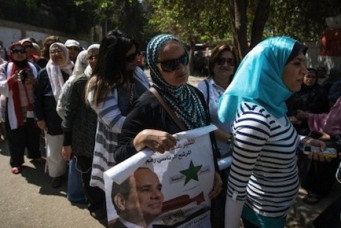The Undecided In Egypt’s Presidential Election
We asked 2,034 respondents, “If the presidential elections were tomorrow, for whom would you vote?” Thirty-nine percent named former army chief Field Marshal Abdel Fattah El-Sisi as their preferred candidate.
Egypt’s presidential elections are slated for May 26 and 27. The Egyptian Center for Public Opinion Research, Baseera, conducted a public opinion poll to measure the support for candidates in the forthcoming vote. The poll was conducted shortly before former army chief Field Marshal Abdel Fattah El-Sisi announced his intention to run for the high office. Nevertheless, a strong plurality of Egyptians supports his presidential bid.
We asked 2,034 respondents, “If the presidential elections were tomorrow, for whom would you vote?” Interviewees were reached via landline and cellular phones between March 24 to 26. Of the 1,300 respondents, 39 percent named Sisi as their preferred candidate, and only 2 percent mentioned other candidates (including Hamdeen Sabahi, Hosni Mubarak and Abdel Moneim Aboul Fotouh). A majority of respondents (59 percent) were undecided about the candidate they will select.
Support for Sisi was higher in urban areas (42 percent vs. 36 percent in rural areas) and in Lower Egypt (40 percent vs. 35 percent in Upper Egypt). There was a similar gap between men and women (41 percent vs. 36 percent). The analysis showed that support for Sisi is positively associated with age and wealth. Nearly 43 percent among the 50+ age group supported Sisi, compared to 37 percent among those below 30. And nearly half (47 percent) of the group belonging to the highest economic level support the former army general vs. 37 percent of those in the lowest economic level.
The portion of undecided (59 percent) is surprising high and might result in a low turnout in the presidential elections. Who are the undecided voters? The undecided likely includes three groups. The first group includes voters who would like to know more about the intentions of different candidates—their policies, strategies and experience. The second group includes supporters of the Muslim Brotherhood, the Islamist movement that the Egyptian government listed as an illegal terrorist group in December. Since the last presidential balloting, the Muslim Brotherhood-affiliated political party has been disbanded. The third group includes citizens who support Sisi but were probably frustrated by the delay in the election process.
The fact that the undecided figure is higher than what has been observed in Baseera’s previous poll (45 percent on March 4) might suggest that Egyptians were expecting Sisi to make an official announcement of a presidential bid sooner. Though he has been in the spotlight since the July ouster of former President Mohamed Morsi, his announcement did not come for nine months. In the meantime, the media nurtured expectations, unsuccessfully speculating several dates for Sisi’s resignation as minister of defense—a prerequisite for announcing his presidential candidacy.
It is worth mentioning that polls during the last presidential election yielded similar results. A poll conducted six weeks before the 2012 election showed that half the respondents were undecided. The figure decreased gradually to reach 33 percent in the last poll that was conducted one week before the first round of the 2012 presidential elections. Even though voter motivations in 2012 and this year might differ, one explanation for similar results might be the short duration of campaigning in the Egyptian elections.
This year’s results show that 84 percent of Egyptians intend to participate in the presidential elections. But historically in Egypt, statistics regarding the intention to vote have been higher than the actual turnout rate. However, the results suggest a generation gap and a lower tendency to vote among the youth, with only 75 percent intending to vote among those aged 18 to 30, a significantly lower figure than what has been observed among the older cohorts (87 percent). Youth participation rates in the January 2014 constitution referendum were similarly low.
Education is a major factor affecting voter participation rates. Only two in three of the less educated youth (under 30) indicated that they are going to participate in the election. This is not the case with university graduates under 30, 88 percent of whom intend to participate in the coming presidential elections. If such a gap continues, young university graduates might have more influence in the next election.
It is worth mentioning that the level of those who intend to vote is 10 points below the number observed six weeks before the 2012 presidential elections. That poll, conducted on April 10, 2012, showed that 94 percent of respondents intended to vote, with no difference between age groups. Even though less educated youth showed a relatively lower figure (87 percent) in that poll, it is still more than 20 points higher than what has been observed recently.
Even though a plurality of voters favors Sisi’s candidacy, there is a risk of low turnout in the May elections. Youth will contribute to the expected low turn out, But the higher no-show rate will probably come from the less educated among the young generation, those who are more likely to be unemployed and marginalized. The results of this poll, however, are based on data collected before the list of presidential candidates was finalized; upcoming polls will shed further light on the voting behavior of Egyptians.
If Sisi seeks a definitive win in the May elections, he must reach out to the marginalized youth who are least likely to vote. Otherwise, the results are still up in the air.
Magued Osman is the CEO and managing director of the Egyptian Center for Public Opinion Research, Baseera.


